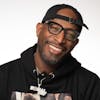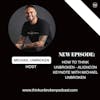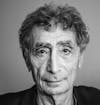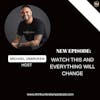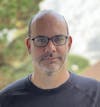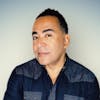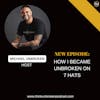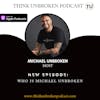Uplifting Stories of Personal Growth and Healing From Trauma
In this episode Michael engages in a series of heartfelt and inspiring conversations that delve into the core values and experiences that have shaped the lives of his guests. The episode begins with... See show notes at: https://www.thinkunbrokenpodcast.com/uplifting-stories-of-personal-growth-and-healing-from-trauma/#show-notes
In this episode Michael engages in a series of heartfelt and inspiring conversations that delve into the core values and experiences that have shaped the lives of his guests. The episode begins with a heartwarming discussion between Michael and Ryan Pineda about the influence of parental values and the significance of love and support. This is followed by a segment with Jeannine Kim, exploring self-love and the concept of energy in personal transformation. The episode also features a conversation with Travis Chappell, emphasizing personal responsibility and self-confidence strategies. Lastly, Andrea discusses self-care, accountability, and overcoming childhood anger, offering practical tools for embracing self-love and letting go of shame. Overall, the episode offers diverse perspectives and valuable lessons on personal growth and empowerment.
************* LINKS & RESOURCES *************
Learn how to heal and overcome childhood trauma, narcissistic abuse, ptsd, cptsd, higher ACE scores, anxiety, depression, and mental health issues and illness. Learn tools that therapists, trauma coaches, mindset leaders, neuroscientists, and researchers use to help people heal and recover from mental health problems. Discover real and practical advice and guidance for how to understand and overcome childhood trauma, abuse, and narc abuse mental trauma. Heal your body and mind, stop limiting beliefs, end self-sabotage, and become the HERO of your own story.
Join our FREE COMMUNITY as a member of the Unbroken Nation: https://www.thinkunbrokenacademy.com/share/AEGok414shubQSzq?utm_source=manual
Download the first three chapters of the Award-Winning Book Think Unbroken: Understanding and Overcoming Childhood Trauma: https://book.thinkunbroken.com/
Join the Think Unbroken Trauma Transformation Course: https://coaching.thinkunbroken.com/
@Michael Unbroken: https://www.instagram.com/michaelunbroken/
Follow us on TikTok: https://www.tiktok.com/@michaelunbroken
Learn more at https://www.thinkunbrokenpodcast.com
Support this podcast at — https://redcircle.com/think-unbroken-with-michael-unbroken-childhood-trauma-cptsd-and/exclusive-content
Advertising Inquiries: https://redcircle.com/brands
Privacy & Opt-Out: https://redcircle.com/privacy
Support the Podcast: Become a listed sponsor!
Follow me on Instagram @MichaelUnbroken
Learn more about coaching at https://coaching.thinkunbroken.com
Get your FREE copy of my #1 Best-Selling Book Think Unbroken: https://book.thinkunbroken.com/
Transform Failure Into Success With Love with Ryan Pineda
Michael: I would have to assume, and I'm not going to put words in your mouth and you know, that's why I'm interviewing you, but having a mom who is a real estate agent and a dad who owned a small business, you know, being entrepreneurs, there's something I would have to assume that subconsciously gets buried into you ‘cuz you're watching them go and try to make things work, having a family, having a home building business. Do you think that's played any role in your resiliency?
Ryan: Yeah, it's interesting because like growing up, I didn't even know the word entrepreneur. Like seriously, like my parents never told me, Hey, you need to start a business, you need to get into real estate, they never said that. It was always around baseball and that they knew that was my passion, they knew like I had the talent to pursue a career in that and like that could be way bigger than any of the other stuff they were doing so, they were never telling me to do that. When I became an entrepreneur, it was literally out of necessity, you know, in 2010, I got drafted by the Oakland a's and you know, in the minor leagues you only make 1200 bucks a month at that time. So, I was like, well, I need to freaking make some money somehow, so what am I gonna do? And I looked at my options and I'm like, well, I can't get a job because I won't have time to practice, I won't have time to work out and do the things I got to do and I'm gonna go leave for six months out of the year so, who's gonna hire me? Right? Who's gonna hire me with the demands that I have, you know? And I was like, they're not, so I gotta figure out basically like a side hustle or something that I can control my own time with.
I got my real estate license ‘cuz I remember seeing my mom just kinda work whenever she wants and I always thought it was weird ‘cuz my dad went to work every day. Like, you know, he managed his small business so he was at work, but my mom was just at home all the time and I'd be like, man, she like does whatever she wants. This is great. So let me become a realtor, and I learned I didn't like being a realtor and all that stuff. But long story short, I think subconsciously what happened for me wasn't that, hey, I need to be an entrepreneur, I think what I really desired was to control my time. And I did not like anyone else controlling my time or telling me what to do, I've never liked people telling me I had to do something and or being obligated to do something. I wanna do things that I want to do. And so, I think entrepreneurship gives you that freedom if you do it right and that would probably be the biggest thing ‘cuz like, I also remember go back to the baseball games and my dad showing up to every game and my mom and we going on these trips. I noticed other kids' parents didn't do that, you know, other kids' parents couldn't do it because they were working, they had to go to their job. And I remember sitting there like, man, that kind of sucks, you know, so I think it's the time thing for me really.
Michael: Yeah. I'm very much the same way. I hate being told what to do. In fact, you know, I think know thy self is probably the most important aspect of life. I'm very stubborn, it is the singular thing that drives me forward and the very thing that also stops me, some cognizant of that. And so, I need people to rein me in sometimes, but I do think about those moments like winning tournaments wrestling or championships playing football when I was a kid and like my mom was never there. Battling her own issues with drugs and alcohol and I'd be there and I'd see the kids whose parents would come and what was interesting, I don't remember being jealous of those kids. I just remember being like, that's so cool that their parents are here. What do you think are the most important lessons your parents have taught you?
Ryan: Hmm. Good question. So, I was raised in a Christian home and obviously I think that's the number one thing that was imparted on me, from an early age. You know, I grew up in the church, you know, I don't have a crazy story about like, rebelling and running away from faith. Some people who grew up in the church do, I was just always very faithful and I knew like I wanted to serve God and be obedient and just live my life in a way pleasing to him. So, that would be the number one thing, hands down, you know, ‘cuz even like watching my parents, like, they didn't drink, they didn't smoke, you know, they were super loving, they're still together today. You know, it doesn't mean that they haven't had issues, they've had plenty of issues, you know. My mom struggled with gambling here in Vegas for a long time, you know, like, they've had plenty of issues and they've had plenty of ups and downs with business. In 2008, they both literally lost everything, my dad lost all of his businesses, my mom lost basically all of her clients, they had some rental properties, they lost all those, the childhood home I grew up in, they lost it so, you know, they literally lost everything. And my parents, I remember when I got drafted, they were really like, hoping that I would be the savior to kind of get the family out of this problem, it didn't work out that way with baseball it ended up working out that way later on with business, but they never recovered from that loss. You know, my mom like was never the same realtor after that, my dad never started a business again after that.
Now thankfully, you know, they're retired now, I've retired them and my dad actually works for me because he wants to. And so, you know, it's great and my mom just kinda like, helps with the kids and hangs out and stuff. So, long story short, what did they teach me? I think, obviously faith was the biggest thing and all the things that come along with faith, like having integrity and being morally sound, all of those things. I think hard work was a thing. I've always been a hard worker and I watched my dad do it, you know, he was an extremely hard worker. I'll say actually the biggest thing that I probably learned was like, what true love looks like? You know, ‘cuz my parents like, showed me love all the time and like they showed it through serving, they showed it through sacrifice, they showed it through discipline, they showed it through their actions. When I look at myself as a parent today, you know, we got a third kid on the way.
Michael: Oh wow. Congrats.
Ryan: Thank you. I know how to model like what being a good dad looks like ‘cuz he was there for me, you know, every baseball game and even today and, and all this stuff I do in business, like he's my biggest cheerleader. You know, it's like that for me is the biggest thing like, man, how can I love, you know, not only my kids and my family and my wife, but my employees, you know, the people who come to my events. Like how do I show them like what true love looks like?
Michael: Hmm. Is there a moment with your parents that would define that love?
Ryan: It's funny ‘cuz like when you first asked me about like the first moment in my life, I couldn't think of like an exact moment it was just like, a broad general idea. And then like, even though I'm thinking now, I'm like, man, I can't like pinpoint a single moment. But it goes back to now that I understand myself so much better as a visionary, I'm not detail oriented, I'm like, big picture like, I don't know how it's gonna happen, but we're gonna make it happen. Right. And then like all my integrators in my companies are super detailed, they could be like, this happened on this date, that's what needs to go down here, you know, this is missing a number, they're so detail oriented and I'm so not, so like, I just think back and like, very broad, big picture type deals so, it's like hard for me to even think of a singular moment.
Finding Self-Love and Acceptance After Abuse with Jeannine Kim
Michael: I remember having this moment where I sat down with my three best friends at the time, this was heading into almost a decade ago now we're very, very close to that window. And I had reached that point, you just used a great terminology, like I had burst it open, I was like, I cannot be this person anymore. And it was really an uprooting of all the things that I had known at the time. But when I made that choice and I made that decision, in a lot of ways, it felt like learning to love myself. Right. This was really the first time I was like, I'm gonna stand up for myself, I'm not gonna be co-dependent, I'm not gonna be a doormat. Most of this language I didn't have, then obviously I was just like, I got to do something differently. Right? And I looked at that time period and I was like, okay, like how do you actually tap into this? Because a lot of people start the journey and they make it a day or a week or six months even, and then it's like, boom, they're ripped right back into that old identity, that old version of themselves. How did you continue to go forward into being you?
Jeannine: You know, it was interesting because I was going on this path quietly, not really knowing where it was gonna take me, probably on some level, hoping everything would stay as it was, there were massive things that happened along the way that told me otherwise. There was my ex-husband at the time wasn't showing up for me mentally, emotionally, you know, just kind of like a revisiting of my childhood right there we were having problems and it wasn't until my father died and he decided he needed to go on a golfing journey with his friends and bike riding journey and not show up that I finally said, you know, I am always there for his family. My father was such a sweet man, I mean, he was an alcoholic, but he had his struggles and to not show up for him, and he died very, very quickly of cancer. And I said, you know, you could do that to me, but you can't do that to him. And something in me again switches so I needed something like that, harsh to do it. And then on top of it, I was just, then at that point we had moved to California and that shifted me hugely ‘cuz I land in California. I'm like, what? Organic fast-food restaurants. Like, I'm like, oh my gosh, these are my people. Like things like this that were little parts of my life just started to feed me and call me even more.
So, I began to go to school in the evening for massage therapy and I became a Reiki practitioner all while I was doing IPO trading for Salomon Smith Barney in the middle of the day, you know, in the daytime. And then I decided, you know what? I've gotta leave. I've gotta leave this financial industry, I'm going to do it in October. And it was like February. I'm like, I was sensing that shifts were happening at work as well. So sure enough, like I bought the plane tickets, I paid for my schooling in Beijing and for traditional Chinese medicine, Fortuna. And I'm like, I just have to tell 'em between now and then and within a month they called me into the office and said, we have to let you go, they left my computer off because I could have made trades that would've totally messed up. So, they said, we have to let you go and there is no reason, we're going to give you a check. We are going to pay for your insurance for the next year and that was it. So, it was almost like I had to build the life and I just really had to not look back. I had to almost like, if you build it, they will come type of a thing and I built it and then all of a sudden these things started to fall into place for me. And I'm not saying that happens to anybody all the time, but after my father died, I was getting at a point in my life where I was like, you know what? What am I doing? I was so unhappy where I was at, the marriage was off, the work was off, all of it was off.
Michael: Yeah. So much of it I think is like just the pursuit into the new version of you is gonna be supported by the energy of the universe. Right? I share this story a lot, probably too much so, but when I think about a lot of the things that I've been able to accomplish, they really all started with being like an eight-year-old boy stealing water to survive and being like, when I'm a grownup, my life won't be like this. And these moments, it's so strange because until you tap, energy is a word that when I want to go into this because this is what I keep hearing and I keep filling in this conversation with you. Energy is this word that I used to be like, that is the dumbest f*cking thing I've ever heard of. Right? What is wrong? What are you talk? Get your hippie ass away from me. Like this is like in my head, the conversations I'm having, right? When people are bringing this up. And then what I started to do was I started tapping deeper into the reality of the world that we're in. And I remember one day, I was probably like 26 or 27, I had just kind of started dabbling into becoming this version of myself and I was standing on the back deck of the house I used to have. And I remember looking up at the moon and it was like one of those super full bright moons and you can see all the star. And I was just like, there's something here that doesn't make sense and I kept thinking to myself like, what is this? Like why do we exist? Why are we here? I still do not have an answer, but what I did realize in that moment was that there is energy in the world that surrounds everything, every living creature being animal, fruit, vegetable plant, whatever, and you have to be willing to tap into it and touch it, and it's weird. Especially at the beginning. But I know that you talk about this concept that everything is energy first, you will probably be far more articulate in explaining what I feel around energy. And so, what does that mean and what role has that played in your life? Because obviously there's all this supporting energy movement, momentum in the universe being like, oh yeah, you want to go to Beijing and get the ticket and go in October? Well, guess what? You're fired. Let us help you.
Jeannine: Well, I am an HSP, have you ever heard of what that is? Highly Sensitive Person, Dr. Lane Aaron's work?
Michael: Yep. But please explain it for those who haven't.
Jeannine: Oh, yes. Okay. So, I wasn't aware of this, you know, growing up at all, you know, this is just something that came into my understanding over the past few years. But an HSP Highly Sensitive Person is somebody you're in born with these specific traits, like they're measurable in your brain as for how you function in the world, basically how you take information in and process it, it's very different. And typically, you know, the way that we could see this in ancient times, like the tribes people, it was somebody who was, you could call him an oracle, you could call him a medicine man, you could call him somebody that could say, you know what, maybe we want to do our crops over here, or we send somethings coming maybe it's time that we leave. You know, storms are coming, somebody who could tell the tribe what's going on. And every man, woman creature has this capacity within them and so, it really means that essentially that we sense things on a very different level. So, when I grew up in that childhood, again, you know, it wasn't maybe that type of physical, too much of the physical I mean, there was that. But there were all these energetic threads, you know, that I read, that I interpreted, that I understood, that just weren't spoken. And on top of it, when I was younger, I would have dreams, all the time. And I remember telling my mother, who raised me, oh my gosh, I remember going to this house and I told her what it looked like, and we pulled up and she just sat there and froze. And as I got older, these things would still happen and so, I would say, what is this? And so now we look at energy, kind of like you said, that hippie dippy thing like what is that all about? But it's really quantum physics. Everything is energy first. And so, when I am in a room, I sense people, I hear people, I don't just hear the words that they say, I feel them. And so, no doubt as a child who knows, you could have been sensing what was going on at that time in the neighborhood in your life, the penople you're connected to, that's called non-local entanglement as well, it's a measurable thing now, but before we just all called it energy.
The Power of Personal Growth: Uncovering Life Lessons with Travis Chappell
Michael: Yeah, and I think that first off, it's incredible and part of that might be your mindset already coming into this like, looking at this idea of failure, perhaps, not even labeling that in your own experience like, I gotta pay this mortgage, I can't get the career, I got the degree, that's seemingly useless, even though I've done all this work. Okay, I'm not going to let that stop me. And what I hear in this is this idea of taking like radical acceptance and responsibility for you, right? Why does that actually matter Travis? Because people hear this, but they don't listen like, why does radical acceptance and responsibility actually matter?
Travis: If you can't take responsibility for anything, then how do you improve? How do you change? How do you grow? How do you get better? If nothing's ever your fault and everything out of your control? Then I guess we should just keep blowing through life and hope that the universe does us, right, and puts good opportunities in front of us and sets us up for success. And to me, that's just a really disempowering way of moving throughout life. If nothing's up to you, then how do you make it better? Do you know what I mean? And a lot of times what you see is people who love to take responsibility when things are going well but hate taking responsibility when things are going poorly. And I think also people get the notion that if they take responsibility, that means it's their fault, and that's not what it means. It's like, well, you people come up with these crazy extenuating circumstances like, well, about this crazy situation of abuse that happened to me when I was a kid I was complete, I'm responsible for that and it's like, well, you mean you're responsible for that going forward. Yes, but was that your fault? No, like you don't have to take fault for that, that was not your fault. But now you do have the responsibility to decide. What are you going to do about it moving forward? Meaning that if you look back to my story in particular, you know, was it my fault that I was pushed into this career path and into a college that provided me with a useless degree upon leaving that I would never be able to use in real life, and I had to figure out my career after being in a position where I was married and had a mortgage to pay like, is that my fault that I was in that situation? Probably not, you might be able to argue that I was because I was an adult when I was made those decisions, but I mean, literally my entire life, my brain was programmed to think a certain way and that's the actions that I took were based on the thoughts and behaviors in the mindset that I was taught growing up. But regardless of whose fault, it was at that point in time, it was a hundred percent my responsibility to figure out what I was going to do about it because what's the alternative? The alternative is to sit there whine and complain about the fact that poor me because I grew up this way and this weird culture that nobody really understands or gets or under or can empathize with. And so now, you know, I'm not set up for life, like my friend that I met last week who was raised in this other household in a different part of the country and got into this, Ivy League school and became a lawyer and has a great, career on Wall Street I wasn't set up for that. So may as well just sit here and feel sorry for myself. I just don't understand what the alternative to taking responsibility is like what where do you think that's going to land you? It's only going to land you in a worse situation where you're feeling even worse for yourself and you end up not doing anything within life and then you end up being that person full of regret, full of remorse, and sitting there still blaming all of the other things and people and circumstances, and events, and everything that happened in your life, for your lack of success, and your lack of happiness, and your lack of fulfillment.
And to me, like it doesn't matter what situation you're born into, you can sit there and wish all day that you were born into a different situation or that you had different opportunities or whatever the case may be but at the end of the day, you're the only one that has to wake up in the morning and look yourself in the mirror and be you. So you better figure it out and start thinking about the solution to the problem and not just continuing to stew on the problem because it just doesn't do anything, doesn't help anybody.
Michael: Yeah, it's powerful. And I've raised my hand first as being guilty of playing the victim role finding myself at this complete utter rock-bottom, blaming the world, blaming homelessness as a child, the circumstance of been through all of the worlds because it's your fault, your fault, your fault. And then I started taking responsibility and the truth of it is like, we're not culpable for the things that happen to us, as we're in developmental or and even sometimes in life, you know what I mean? But there's a point where you do have to say, I'm going to be the hero of my own story because guess what? There's no Disney moment, nobody's coming to save you, your life isn't magically going to be different, and if I had a fucking magic pill, dude, that's what it would be because that's the key, right there what you just said, like you got to take responsibility.
I was listening to having a conversation about listening to Guy Raz and talking about this idea of dealing with and handling rejection. I have a theory that one of the reasons that people have such a difficult time with taking responsibility, is this idea of rejection and embarrassment. And I know that in your own personal journey like building businesses, trying things knocking on doors at someone who's so Cutco, I know that you have probably dealt with a litany of rejection and potential embarrassment. How do you deal with that in your life to catapult yourself forward?
Travis: That's a good question man. I think success in business and sales and making money in general, has to do with your ability to get rejected and then move on and try it again and continue to persist. And so the biggest in a short period of time, the best way that I can help anybody listening to this handle rejection a little better is that the pain of rejection is really just a symptom of a greater problem. If you're getting rejected and it hurts, you to the point where you're like quitting things or you're almost quitting things or you're constantly thinking about quitting things because the rejection hurts too bad that's just a symptom of the greater problem is your lack of self-confidence. Self-confidence is the root of the rejection problem, and so it's your responsibility to realize that this is why this rejection is hurting me because my confidence level is just too low to be able to read to recoup from. So I look at it as kind of like a bank account every time you get rejected, it's like a withdrawal, all from your bank account, it's something debited from your account. But you can make deposits into that account, just like you can make withdrawals from that account and so a few ways to do that is to start depositing more until your self-confidence. So listening to a podcast like you're listening to right now can help increase your self-confidence because you're learning something, you're increasing your knowledge, the more knowledge you gained an industry or field that you're not familiar with the more confident you'll be to navigate that field or that industry.
So gaining knowledge, learning getting new information, reading a book, listening to a podcast that's going to be a deposit in your self-confidence bank. There's the consistency that's going to be a depositor self-confidence bank, you have done this a bunch of times, you know, and I'm still alive. I didn't get hurt like thinking about the worst-case scenario a lot, which helps me deposit into my self-confidence back, what's the absolute worst-case scenario. Even I was knocking on doors, the absolute worst-case scenarios are not going to store and they tell me to get the fuck off their porch, like, is that really that big of a deal? No, because the next guy probably isn't going to be that mean the odds of that happening twice in a row are pretty low. So now I'm going to just go to the next house and see you know what it is like it just imagining the worst-case scenario to me and then like putting myself in that scenario and then understanding that, you know what? I think I'm going to be okay if that happens, if this person says no, that's the worst-case scenario, they said no, okay, who cares? Move on to the next person. Somebody's going to say yes, you know what I mean?
So, I think the worst-case scenario is a deposit, but hands down the best way to deposit into your self-confidence account are to keep the promises that you make to yourself. And this is why I think people have a huge problem with rejection and with confidence, in general, is that they don't even like themselves.
If you don't like yourself because you don't trust yourself, then how can you convince other people to like you and trust you? And that's the crux, that's the crux of all business, that's where business happens is when people know like or trust you or know like and trust you.
So if you don't even like trust yourself, because you subconsciously know that you keep breaking promises to yourself over and over again, then you're going to portray or display that energy to other people and they're going to pick up on that like something's not trustworthy about this guy. I do not trust me about this girl because you don't even trust yourself because you said that you were going to, name it right? At you said you were going to read a book this month and you got to the first chapter and you never do thing else and then you gave up on you were going to wake up at 6 o'clock for the next week and then you didn't do it on day two of you said that you were going to, go to the gym, whatever it is fill in the blank even if it's the smallest possible thing.
If you didn't keep that promise that you made to yourself because your over-committing all the time to these, all these promises and all these commitments, and all these goals that you're setting because you hear these are good things to do but you never follow through on any of them. You are consistently telling yourself that you are not trustworthy, and that's why you don't like yourself, that's why you don't trust yourself and that's why you don't have any self-confidence and that's why it hurts so bad when other people reject you, because every time someone rejects you, is just a validation of your subconscious thoughts about your own self, which is I'm not worthy, I'm not good enough, I'm not worthy of somebody's trust because if you don't even do, believe those things about yourself, somebody else like confirms that when that's a big pain like that's a big withdrawal from that self-confidence account.
Letting Go of Shame and Embracing Self-Love with Andrea Ashley
Michael: I don't know if this is holding true for you or something you've experienced, but I realized like one of the most important things in self-care is doing what you said you're going to do. Now, a big part of that's reparenting obviously, but it's like the people who know me best in my personal life, they know that when I say I'm gonna do something it's done. And that to me has just become not only a badge of honor, but just proof that I used to be a guy who was unreliable to everyone all the time, but especially myself and through this healing journey and through so many of the things that we talk about, it's different. So, I'm wondering if a big part of this for you has also just been in self-accountability and navigating that.
Andrea: Yeah, it is. Because I think that I hold true to what I say to other people, you know? But I think part of why it's coming up too is because I've it's just been in like the past two years that I really feel like I'm stepping into my purpose too, you know? So, I think that that brings up a lot of things. I think one thing that's interesting that you say too about, you know, just being angry at yourself, I think what also what happens is, you know, as kids, it's not safe to outwardly express our anger towards our parents. And so, we redirect that like at ourselves too. And so, I think it's also like looking at like, is this anger misdirected at myself, you know?
Michael: Yeah, no, I do know, and it's what's really interesting is, as you were saying that, my thought was if I got angry at my parents, I might as well just plan on crying and getting my ass kicked the rest of the day. What an odd thing that as children, we don't have the safety to have emotional connection at that level, right? Because of our parents and the choices and decisions that they make. Whereas now I'm like, I encourage, like, when I'm coaching my clients, I'm like, yeah, be angry. It's okay. You don't have to hide from it, because if you hide from anger, you're not gonna know love. My thought on it is, how in the world can you experience any emotion if you cannot experience all the emotions? And that's been a hell of a journey for me. In order to imagine like, I don't know what it was like for you but how did you find the safety to have emotions? Because I imagine being that young and stepping into drugs and alcohol in the way that I did, it's a turnoff valve. So, how'd you get the valve turned back on?
Andrea: You know, in my family it was only like certain emotion, like I think for me, it's been slow to release like the sadness, that's been like the thing that's been the most difficult for me to tap into. And I would say it's really been in the past year or so that the tears are finally really starting to come because what I saw in my home growing up was like anger or numbness, right? So, it's tapping into that sadness I think it's just been, I think it's just a natural process of recovery and healing and I think that our body and our psyche just knows when it's safe for certain things to start to come up, you know? And really getting an understanding of like what it is that I'm really feeling or what is the underlying fear beliefs to kind of get clarity on that allows for me to get like clarity on what are the emotions that I'm feeling, you know?
Michael: How do you get clarity in it? Because I think that's a place, historically I had been stuck and I know that that is a place where many people get stuck because they're like, what is this actually like? How do you get clarity? How have you guys discovered that?
Andrea: A lot of therapy and in a lot of meetings and yeah, 12 steps and everything talking to other people. I think it's just like a process of doing the work, right? I don't have like a specific answer.
Michael: Yeah, no, I think you're right.
Andrea: I think it's like looking at trauma responses too. So really, you know, anytime I'm having like an overreaction to something, like I'm not reacting to something in the present that has been like one of the biggest beauties of an areas that I've been able to see my growth is that I'm really able to now identify pretty much like in the moment, oh, you're not like you're having some sort of an emotional flashback right now like what you're reacting to is not what you think you're reacting to.
Michael: Yeah. It never is. Like that's been the biggest thing for me, especially probably in the last six years, five years, four years, last year, is just looking at it and going, dude, the response that you're having to this either A – is not warranted, or B – is so tied into something that happened 13, 23, 40 years ago, almost at the 0.9 years ago at this point where it's like, what's really happening here? It's like the arguments, the things that we get mad at, it's always about like, you don't put the keys in the right place. I'm like, it's not about the keys, it's about the fact that this happened or that happened and then you tie in deeper and I think getting that place of in real time in the presence making meaning of that, like that's f*** powerful.
Andrea: It is. And here's one tool for people, because I think that that take time and I think a lot of people might be able to recognize, Hey, I'm having an overreaction, but I don't have any idea where this stems from. I think one good tool for that is to like a trauma response log. So, anytime you're having some sort of an overreaction, you know, writing down what happened, what you were feeling in your body, what you were feeling emotionally, what were the thoughts going through your head and how did you respond and you know, perhaps through time you're gonna be able to kind of see some patterns and connect the dots on what might be underlying it.
Michael: I think that is a great tool, so thank you for sharing that. I mean, you gotta get pretty damn real with yourself to be able to step into that and I hope people will honor some compassion for themselves as they navigate that world, because I have done that and there's a lot of work in this process that s**k like it just, I'm gonna call it what it is. It just sucks. And that's one of the things that for me, s*ck the most in part because like A – I have a very stubborn personality and B – because I was having to come to realize like, I can control a lot of these responses, and that was really interesting. I'm wondering as you have created this podcast, which is absolutely incredible and it's one of my favorite shows, and as you've had all these conversations, do you find that there any elements of what you do that have helped you just as an interviewer or somebody having these conversations that you carry into your life? Because for me, when I'm interviewing someone, like I pull tactical stuff into my life immediately and I fear that unfortunately a lot of people are just listeners, they're not doers. And so, I'm wondering like, what is the impact that like having these conversations with people have in your life?
Andrea: Well, I just shared one like with the inner child and the outer child, you know, that's been the coolest thing about this is, and what I try to, you know, portray to my listeners, like, I don't have this shit figured out. You know, like I'm still a shit show and I don't want them to ever think that like I know what I'm doing like I don't, you know. And so that's like what's been really cool for me is I feel so honored that I get to do this podcast like I'm still going through it, you know, like this is me still healing and growing and I feel so honored that I'm being supported as like, as I go through this journey, like by my listeners and by my community and yeah, like I get to talk to some really great people and so that's an example, it's just all the time. I mean, sometimes you gotta take some of it and leave the rest behind. But generally speaking, I think I have pretty good conversations, but sometimes it takes a little while to sink in. And I also like to get feedback from my listeners on like what they take away from the episodes ‘cause then that also, you know, helps me to see things through a certain perspective as well.
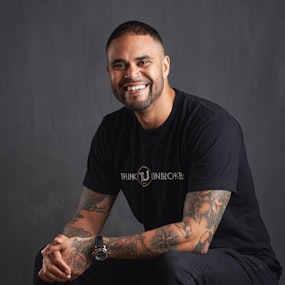
Michael Unbroken
Coach
Michael is an entrepreneur, best-selling author, speaker, coach, and advocate for adult survivors of childhood trauma.
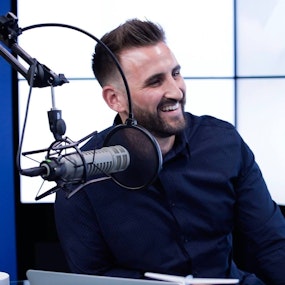
Travis Chappell
Founder
My name is Travis Chappell — and I have made it my mission to help a million people cultivate genuine relationships the right way.
I’ve found that there are two types of people: 1.) Those who think they are networking properly, but are actually really annoying everyone they come in contact with by barfing their elevator pitch, throwing a business card or five in your face, and moving on to the next person (I call that person Networking Ned) and 2.) Those who hate Networking Ned so much that they avoid the practice altogether, for fear of becoming that person.
After publishing over 200 episodes of my show, Build Your Network, I’ve picked up on a few secret techniques and strategies that will help you ditch the fear of networking, avoid becoming Networking Ned, and build genuine relationships that will unlock the next level in your life.
Ready to uncover those secrets and build meaningful relationships with people who appear to be unreachable? I’d love to help you!
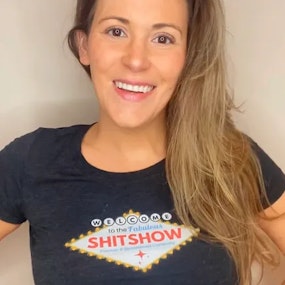
Andrea Ashley
Podcaster
Andrea grew up in an alcoholic home and was the only child of an alcoholic mom and alcoholic dad. She turned to drugs and alcohol at 12 and became the focus of the family for the next seven years. She got sent to rehab for the first time in eighth grade. For seven years, she was in and out of rehabs and boarding schools. It did work in saving her family because her mom stopped drinking as much and her parents stopped fighting as much since they had to come together to deal with the nightmare that she was.
At 19, Andrea got sober. But that was only the beginning of yet another journey through a deeper recovery of healing her adult child. Seven years sober, she found herself in a toxic relationship. Dating for less than a month and she reacted as if her life was over. She became a non-functioning human. But she had an aha moment realizing that her feeling wasn’t actually connected to the heartbreak but it was rooted in her childhood.
Nine years sober, she found herself again in another toxic relationship that was associated with feelings of shame and powerlessness. When that relationship ended, she knew she had to treat it just as seriously as her alcoholism.
It has been four years and the transformation has been mind-blowing. Her journey to healing her unresolved childhood pain led Andrea to launch the Adult Child Podcast, which now impacts thousands of people who are also dealing with their own adult children.
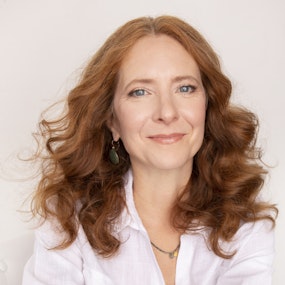
Jeannine Kim
Intuitive | Astrologer | Medium | Holistic Health Practitioner | Yogi | Writer
For over 24 years Jeannine has been
offering healing wisdom, guidance & support
to clients worldwide as an Intuitive Reader,
Astrologer, Medium, H.H.P., Yogi, Teacher & Writer
Her main passion is sharing
the ancient and simple YET potent,
ways of how we can authentically BE
in all areas of our lives.
Jeannine teaches the practical steps
on how to access our INTUITIVE Selves
in every moment and empowers others
to their own sovereignty...building
our new world from the inside out.
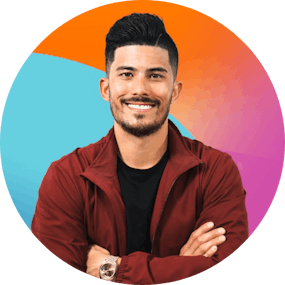
Ryan Pineda
Entrepreneur
Ryan Pineda has been in the real estate industry since 2010. He began his career as Realtor and soon realized that wasn’t the path he wanted to continue on. In 2015 with only $10,000 in the bank, he began flipping houses. Since then he has flipped hundreds of homes, purchased hundreds of rentals, and opened other multi million dollar businesses. He has amassed over a million followers on social media where he teaches others how to build wealth and freedom.
Welcome to The Think Unbroken Podcast!
Here are some of my favorite recent guests!






















